仁爱版英语九年级上册Unit 2 Topic 1 Section B --句型操练
Unit2+Topic+1+课文详解课件2023-2024学年仁爱版九年级英语上册

A. too many
B. too much
C. much too
D. too
( B ) 2. — Don’t smoke. It’s ________ to our health.
— Sorry, I won’t do it again.
A. harm
B. harmful
C. harms
D. harmed
( C ) 3. He has a headache. He feels difficult ________.
A. breathe
B. breath
C. to breathe
D. to breath
单项选择
( C ) 4. She is so noisy that I can’t ________ her.
bees and butterflies dancing.
butterfly n.蝴蝶 see sb. doing sth.看见某人正在做某事 see sb. do sth.看见某人经常在做某事
• Kangkang: Everything has changed.
一切都变了。
• Michael: Do you want to have a picnic here?
Unit2 Topic 1
点击此处输入副标题
Section A
Section A
正在计划
• (Kangkang, Jane, Maria and Michael are planning a picnic for Sunday.)
• Jane and Maria: Kangkang, where shall we go? 野餐
我总是心情很差。
九年级英语上册《Unit 2 Saving the Earth》Topic1 SectionB 教案 仁爱版
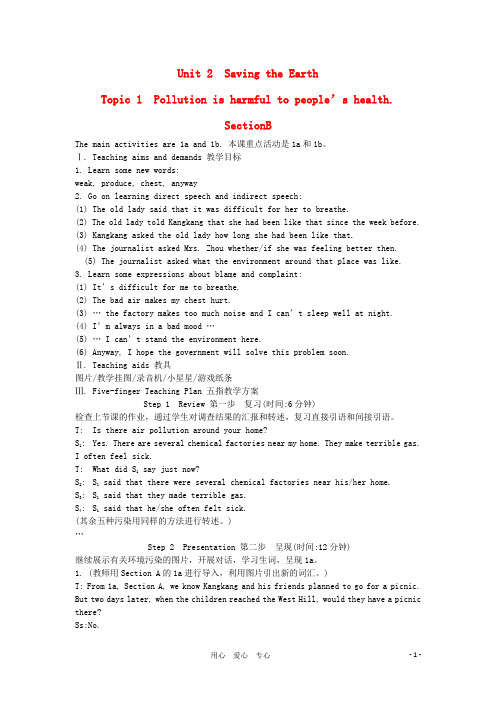
Unit 2 Saving the EarthTopic 1 Pollution is harmful to people’s health.SectionBThe main activities are 1a and 1b. 本课重点活动是1a和1b。
Ⅰ. Teaching aims and demands 教学目标1. Learn some new words:weak, produce, chest, anyway2. Go on learning direct speech and indirect speech:(1) The old lady said that it was difficult for her to breathe.(2) The old lady told Kangkang that she had been like that since the week before.(3) Kangkang asked the old lady how long she had been like that.(4) The journalist asked Mrs. Zhou whether/if she was feeling better then.(5) The journalist asked what the environment around that place was like.3. Learn some expressions about blame and complaint:(1) It’s difficult for me to breathe.(2) The bad air makes my chest hurt.(3) … the factory makes too much noise and I can’t sleep well at night.(4) I’m always in a bad mood …(5) … I can’t stand the environment here.(6) Anyway, I hope the government will solve this problem soon.Ⅱ. Teaching aids 教具图片/教学挂图/录音机/小星星/游戏纸条Ⅲ. Five-finger Teaching Plan 五指教学方案Step 1 Review 第一步复习(时间:6分钟)检查上节课的作业,通过学生对调查结果的汇报和转述,复习直接引语和间接引语。
仁爱版九年级英语上册Unit 1课中、课后习题答案
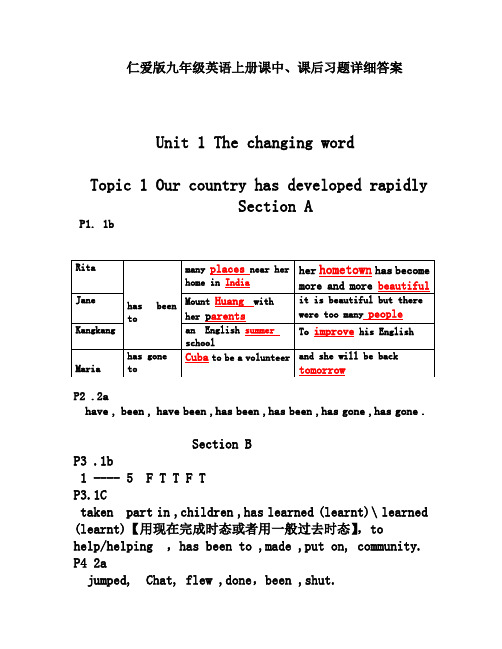
仁爱版九年级英语上册课中、课后习题详细答案Unit 1 The changing wordTopic 1 Our country has developed rapidlySection AP1. 1bP2 .2ahave , been , have been ,has been ,has been ,has gone ,has gone .Section BP3 .1b1 ---- 5 F T T F TP3.1Ctaken part in ,children ,has learned (learnt)\ learned (learnt)【用现在完成时态或者用一般过去时态】,tohelp/helping ,has been to ,made ,put on, community. P4 2ajumped, Chat, flew ,done,been ,shut.P6.1b1.C2.E3.A4.B5.F6.DP6.1C1)More and more ring roads and subways have appeared。
2)Buildings in Beijing are becoming taller and brighter。
3)There are more kinds of food and clothes to satisfy people 's needs。
4)Children can study not only in model school but also on the Internet。
P6.3Changes in my hometownGreat changes have taken place in my hometown since the reform and opening up.In the past,people lived in small and old houses.The farmers planted crops only with the help of farm animals.Children studied in old schools.But now,most people lived in tall buildings.The farmers can plant crops with the help of farmer machines and children can study not only in model school but also on the Internet.Thanks to the government ,my hometown is becoming better and better.P8.1aIn the past1.playing hide - and - seek2.playing cards or chess3.watching operas4.listening to the radioAt present1.Playing and watching team sports,2.playing games on computers3.chatting on the Internet4.traveling all over the worldP8.1b1.When they are not working or going to school.2.略3.略Unit 1 The changing wordTopic 2 The population in developing countries is growing fasterSection AP9.1b 1--4 T F F FP9.1csome →any ,such →so ,already→ yet ,been →goneP10.2A.☑cinema ☑departmentB. ever, never, just, ever, already, yet P10.31. get lost2. called, up, in3. kind3.hate. likeSection BP11 .1b1. B2.C3.D 4 .AP11 .1c90 million, China, 1.37 billion, second, larger,faster, solveP12. 2.973 nine hundred and seventy-three3 980 three thousand, nine hundred and eighty98 721 ninety-eight thousand, seven hundred andtwenty-one768 540 seven hundred and sixty-eight thousand, five hundred and forty2 346 780 two million, three hundred and forty-six thousand, seven hundred and eighty82 364 580 eighty-two million, three hundred andsixty-four thousand, five hundred and eighty405 000 000 four hundred and five million5 555 555 555 five billion, five hundred and fifty-five million, five hundred and fifty-five thousand, five hundred and fifty-fiveP12. 3.l. China has the largest population. The population of China is 1,37 billion .Canada has the smallest population. The population of Canada is 35 million.2.The population in developing countries is larger than that in developed countries.3. The large population may cause less living space,more pollution and so on.4.略Section CP13.1b1.B2. C3.AP14.1c1.Population of China 1.37 billion2.less living space3.fewer job opportunities4.less water and energy5.crowded cities6.heavy traffic7.worse natural environments8.the one-child policyP14.2find, grows/is growing, become, has, reached,carried out, worked, faces/is facingP14.3bChina has the largest population in the world. It has caused many problems. Everyone should dosomething to solve them.First, the government should keep the one-child policy to control the increasing population, and practice the reform and opening-up to develop our economy. Only in this way can we get more jobs and improve our living conditions. Second, the energy and water is becoming less and less. We'd better save them as much as possible, and try to find more new energy. In order to solve the problem of heavy traffic, we call on everyone to take a bus or walk as often as possible.Section DP15.Grammar1.just,never2.already3.yet,everFunction1.hate ,So2.byrger than4.has ,fifth5.ThanksP16.1.P16.2I am Li Hua. I would like to live in a big city, because it is convenient. First of all, it has excellent public transportation so that I can go to any part of the city. Second,it has many places of interest. I can visit these interesting places with my friends in our spare time. What's more, it has many shopping centers and markets. We can buy things easily.Unit 1 The changing wordTopic 3 The world has changed for the betterSection AP17.1bIn the past :☑terrible traffic☑dirty streets☑dangerous to liveNowadays:☑beautiful parks☑famous museums☑excellent restaurants☑good schoolsP18.2since, used to, has improved, theaters, wonderful,as a matter of factP18.31.for, since2.since , for,for3.sinceUnit 1 The changing wordTopic 3 The world has changed for the betterSection BP19.1b.1---- 5 F T T T FP19.1c.homeless,provides,medical treatment,trains,(to)find/get jobs,goodP20.2provided ...with,medical treatment,in need,decided on ,feel good,get used toP20.3for ,for ,since,since,since,forTopic 3 The world has changed for the betterSection CP21.1b.BP21.1c.1d.1.故意地2.支持,养活3.No, the government needs to do more.P22.3The world is becoming better and better. But it still has many problems. For example, there 're many homeless people all over the world. Some children have become laborers for a living. What's more, sometimes cruel wars break out in some areas. Some people are homeless because they do not earn enough money or do have a job. They must work very hard to live. They even cannot raise tl children. The governments have worked hard to support the homeless for m years and the world has changed for the better.Topic 3 The world has changed for the betterSection DP23.Grammar1.have been2. has improved , since ,came3.Since,started,has helpedFunctioned2.As3.visit4.on5.withP24. 1b.1. Project Hope is an education program to help students.It offers education program to the poorest parts of China, and helps poor families afford an education for their children.2.Project Hope had raised 8.73 billion yuan and hasbuilt 18.002 Hope Primary Schools since it started in 1989.3.Project Hope has made important contributions to boththe education and the health of children. It has also encouraged the moral development and modern thinking of students.4.略。
最新推荐 仁爱版九年级英语上册unit1-2重要知识和语法归纳
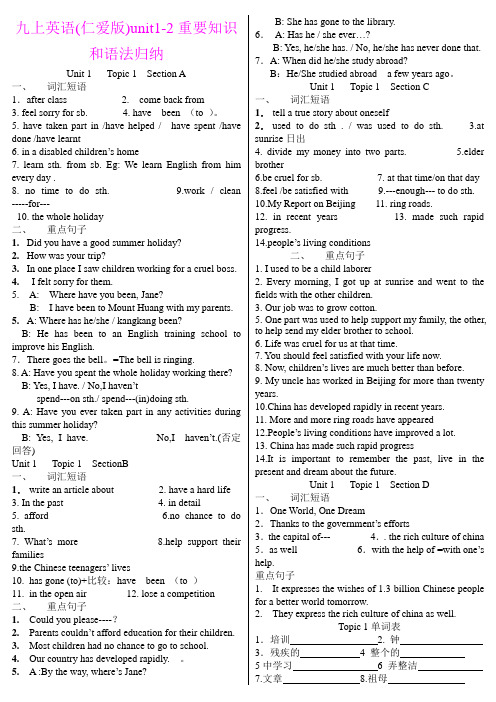
九上英语(仁爱版)unit1-2重要知识和语法归纳Unit 1 Topic 1 Section A一、词汇短语1.after class 2. come back from3. feel sorry for sb.4. have been (to )。
5. have taken part in /have helped / have spent /have done /have learnt6. in a disabled children’s home7. learn sth. from sb. Eg: We learn English from him every day .8. no time to do sth. 9.work / clean -----for---10. the whole holiday二、重点句子1.Did you have a good summer holiday?2.How was your trip?3.In one place I saw children working for a cruel boss.4.I felt sorry for them.5. A: Where have you been, Jane?B: I have been to Mount Huang with my parents.5.A: Where has he/she / kangkang been?B: He has been to an English training school to improve his English.7.There goes the bell。
=The bell is ringing.8. A: Have you spent the whole holiday working there? B: Yes, I have. / No,I haven’tspend---on sth./ spend---(in)doing sth.9. A: Have you ever taken part in any activities during this summer holiday?B: Yes, I have. No,I have n’t.(否定回答)Unit 1 Topic 1 SectionB一、词汇短语1.write an article about 2. have a hard life 3. In the past 4. in detail5. afford6.no chance to do sth.7. What’s more 8.help support their families9.the Chinese teenagers’ lives10.has gone (to)+比较:have been (to )11.in the open air 12. lose a competition二、重点句子1.Could you please----?2.Parents couldn’t afford education for their children.3.Most children had no chance to go to school.4.Our country has developed rapidly. 。
仁爱版九年级英语上册Unit2Topic1SectionB教案

仁爱版九年级英语上册Unit2Topic1SectionB教案Unit 2 Saving the EarthTopic 1 Section B教案教学目标1.知识与能力目标Words and phrases: pain, produce, awful, bear, harmful, chest, editor, breathe/breath, soil get a pain in…, what’s worse, too much noise, too many problems, breathing problem, be harmful to, make a mess of, throw…aroundSentences: It’s difficult for me to breathe./ I’ve got a pain in my throat./ It’s really awful.A: How long have you been like this? A: Have you seen a doctor?B: I’ve been like this since la st week. B: Not yet.Grammar: Present Perfect (past participle和疑问句的问答).2.过程与方法通过谈论环境问题,让学生了解不同种类的污染及其危害。
3.情感态度与价值观引导学生关注环境问题,树立绿色环保意识,增强忧患意识和社会责任感。
教学重点1. some new words and useful phrases; the present perfect tense2. the present perfect tense教学过程Step 1 Review1. go over the phrases in section A2. Guide the Ss to discuss different kinds of pollution ingroups and share the answer together. Step 2 Presentation1. Watch the flash, then answer the questions below.1) Does Bruce look well?2) What’s wrong with him?3) How long has he been like this?4) Has he seen a doctor?2. Show a picture of the polluted West Hill, let the Ss listen to 1a once and tick the questions they hear in part A of 1b. Then check the answers together.A. Listen to 1a and check the questions you hear.1) What’s wrong with you?2) How long have you been like this?3) Where have you been?4) Have you seen a doctor?5) Have you noticed the dead fish in the river?B. Listen again and match each question above with an answer below.3. Read 1a and answer the questions.1) What caused Mrs. Zhou’s problems?2) What will Kangkang do?Step 3 Consolidation1.分角色朗读2a,选择四组进行比赛,激发学生朗读兴趣。
仁爱版九年级上册英语第二单元课件
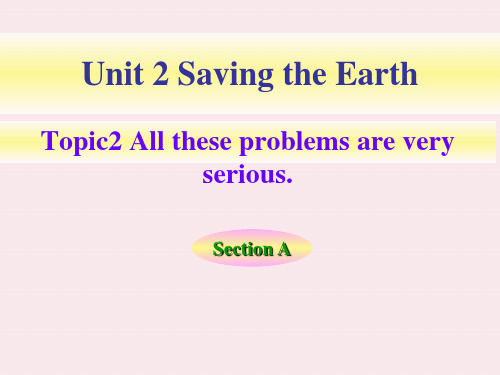
Unit 2 Saving the Earth
Topic 1 Pollution has caused too many problems .
Section B
Kangkang was going to leave the West Hill.
He met Mrs. Zhou.
They had a talk. Kangkang asked Mrs. Zhou some questions.
help her. 3. Is there _a_n_y_t_h_in__g_ wrong with your computer?
4. Jim looked for his pencil-box _s_o_m__e_w_h_e_r_e__ , but he didn’t find it.
5. I stayed at home last week. I didn’t go _a_n_y_w__h_e_r_e _.
不定代词作主语时,谓语动词要用单数。
1c Read 1a and complete trees’ functions.
Tree’s functions
A. Trees can stop the wind from blowing the earth away.
B. A lot of water can be saved by forests. C. They can also stop the water from
Unit 2 Saving the Earth
Topic2 All these problems are very serious.
Section A
pollution
many trees cut down
仁爱版九年级英语上册知识点汇总
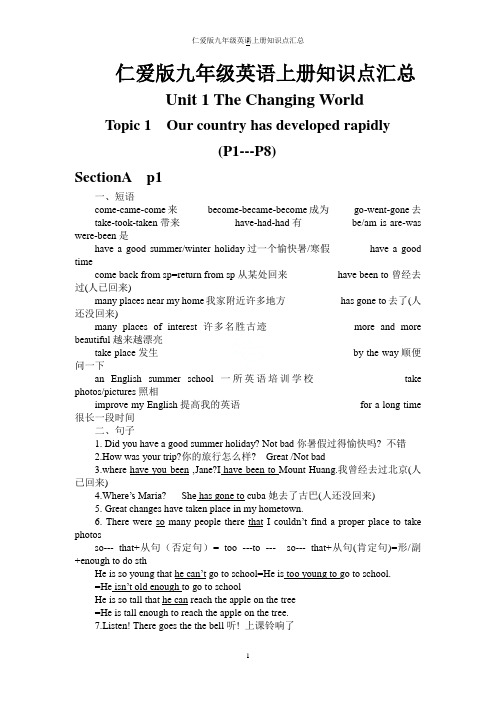
仁爱版九年级英语上册知识点汇总Unit 1 The Changing World Topic 1 Our country has developed rapidly(P1---P8)SectionA p1一、短语come-came-come来become-became-become成为go-went-gone去take-took-taken带来have-had-had有be/am is are-was were-been是have a good summer/winter holiday过一个愉快暑/寒假have a good timecome back from sp=return from sp从某处回来have been to曾经去过(人已回来)many places near my home我家附近许多地方has gone to去了(人还没回来)many places of interest许多名胜古迹more and more beautiful越来越漂亮take place发生by the way顺便问一下an English summer school 一所英语培训学校take photos/pictures照相improve my English提高我的英语for a long time 很长一段时间二、句子1. Did you have a good summer holiday? Not bad你暑假过得愉快吗? 不错2.How was your trip?你的旅行怎么样? Great /Not bad3.where have you been ,Jane?I have been to Mount Huang.我曾经去过北京(人已回来)4.Where’s Maria? She has gone to cuba她去了古巴(人还没回来)5. Great changes have taken place in my hometown.6. There were so many people there that I couldn’t find a proper place to take photosso--- that+从句(否定句)= too ---to --- so--- that+从句(肯定句)=形/副+enough to do sthHe is so young that he can’t go to school=He is too young to go to school.=He isn’t old enough to go to schoolHe is so tall that he can reach the apple on the tree=He is tall enough to reach the apple on the tree.7.Listen! There goes the the bell听! 上课铃响了8.sb have /has been to sp某人曾经去过某地(人已回来)sb have/has gone to某人去了某地(人不在说话者的地方)sb have /has been in sp某人呆在某地Section B P3Words:develop(v)----developing/developed(adj)-----development(n)发展发展中的/发达的发展/达;开发educate(v)---education(n)教育communite(v)---communication(n)交流decide(v)---decision(n) 决定feed-fed-fed喂,饲养do –did-done做shut-shut-shut关上chat-chatted-chatted聊天spend-spent-spent 花费feel-felt-felt感觉fall-fell-fallen掉learn-learned/learnt-learned/learnt学dream-dreamed/dreamt-dreamed/dreamt梦想tell-told-told告诉write-wrote-written写take part in+活动join+组织leisure /social /volunteer activities业余/社会/志愿活动be a volunteer成为一个志愿者disabled children’s home 一所残疾儿童养育院tell stories to the kids 给孩子们讲故事feed the disabled children 给残疾儿童喂饭a wonderful experience 一次精彩的经历learn a lot from sp 从…中学到许多have no time/money/chances to do sth没有时间/钱/机会做某事have no time to travel没有时间去旅行write an article about teengers/smoking/health写一篇关于青少年/抽烟/健康的文章tell sb something about 告诉某人一些关于have/live a hard /happy life过着艰苦/幸福的生活have a balanced diet 饮食均衡describe sth in detail/detailedly 详细地描述某物in the past /at present/nowadays/now/in the future过去/现在/如今/现在,此刻,/将来spend their childhood/the evening/summer holiday /spend the whole holiday度过他们的童年/过夜/度过暑假/度过整个暑假couldn’t/can’t afford the children’s education供不起孩子上学child laborers做童工in order to +V/so that+clause为了1.support their families养家糊口get a goodeducation受到良好的教育give support to sb/poor families为某人/贫困家庭提供帮助get enough food adj/adv+enough获得足够的食物day and nightdevelop rapidly迅速发展with the development of 随着…的发展I have ever---(clean rooms/jump rope/chat online/have summer classes/dofarm work)1).Have you ever taken part in any social activities?/told stories to the kids/ fed /cleaned rooms for/cooked for the disabled children? Yes, I have/No, I haven’t2)你曾经参加过一些公益活动/给孩子讲过故事/给残疾儿童喂吗?3)Though I had no time to travel, I still felt very happy.1.虽然我没有时间去旅行,但是我仍然感到很开心4)Could you please tell me something about Chinese teenagers?告诉有些有关---5)Can you describe it in detail?你能详细地描述一下吗?6)They had to be child laborers.7)They worked day and night and never had enough food to eat.8)our country/ china has developed rapidly.中国发展迅速.9)With the development of China, many things have changed, and childrencan get a good education now.随着中国的发展,---10)China is a developing country while the USA is a developed countrySection C p5Succeed(v)--- Success(n)—successful(adj)---successfully(adv)narrow-wide low-tall dark-bright slow-quick keep-kept-kept保持see sth oneself 亲眼所见/目睹see sb doing/do sththe whole city/night/family/class 整个城市/整晚/整个家庭/班级crowd in 挤在poor conditions/living conditions 条件很差/生活条件have a chance to do sth 有一个机会做某事receive a good education 接受良好的教育far away遥远by letter and telegram/by doing sth通过信件和电报keep in touch with 保持联系get in/lose touch with取得/失去联系a kinds/sorts of种类all/different kinds/sorts of clothes各/不同种类的衣服make rapid/much progress取得迅速的进not only ---but also--- 不但---而且be successful/succeed in doing sth 成功做某事dream about doing sth 展望,梦想sth happen to sb某人发生了某事sb happen to do sth 某人凑巧/碰巧做某事be like 象reform and opening-up.改革开放living conditions 生活条件working tools劳动工具communication tools通讯工具1.She has seen the changes in Beijing herself.她亲眼目睹了北京的变化2.People kept in touch with their friends and relatives far away mainly by letter or telegram.人们主要靠信件和电报与远方的亲朋好友保持联系.3.Beijing has made rapid progress and it has already succeeded in hosting the 2008 Olympic Games.北京取得如此迅速的进步.它还成功举办了2008年的奥运会.4.I think it is important to remember the past, live in the present and dream about the future.我认为记住过去,立足现在,展望未来是非常重要的5.What were Beijing’s roads like in the past?过去北京的道路什么样?6.What has happened to Beijing’s roads now adays?现在北京的道路发生了怎样的变化?7.What will Beijing’s roads be like in the future?将来北京的道路会是什么样?SectionD p7conclude(v)---conclusion(n)结论P7 1.There is a very popular organization for young people in our community. I joined it two years ago. And I have taken part in many interesting activities. What we have done can not only help others but also make ourselves happy.Last Sunday, we went to an old people’s home. After helping them do some housework, we sang, danced and played games with them. The old people were excited at our visit. They told us interesting stories about themselves. We all had a good time.After this visit, my friend and I decided ti do more things to help them. Now more than 30 volunteers have joined our club. Everyone thinks the experience is wonderful.watch a movie in the open air/in the movie theater观看露天电影/电影院watch TV at homego roller skating/skiing/swimming/shopping/boating/fishing/climbing滑旱冰、滑雪游泳购物划船钓鱼登山Play hide-and-seek/computergames/basketball/football/baseball/table tennis/tennis/volleyball玩捉迷藏电脑游戏打篮球足球棒球乒乓球网球排球play the piano/the guitar/violin/the drums弹钢琴吉他小提琴打鼓fly kitesbe popular with 在---之间收欢迎write a composition写一篇作文an example of an outline一个示例提纲follow these ste遵循这些步骤consider sth carefully 仔细思考. draw up拟定,起草check over检查with the help of在----帮助下thanks to多亏,由于thank you/thanks for doing sth 因…而感谢你语法:现在完成时:p118表示开始于过去并持续到现在的动作或状态./表示过去发生或已经完成的某一动作对现在造成的影响后结果.结构: 肯定句:主语+have/has+动词的过去分词:Now our country has developed rapidly否定句: 主语+haven’t/hasn’t+动词的过去分词: I haven’t seen him for a long time一般疑问句:Have/Has+主语+动词的过去分词: Have you ever fed them?Yes, I have. No, I haven’t特殊疑问句:疑问词+ have/has+主语+动词的过去分词:Where have you been?时间状语: already已经/肯定句,yet还/仍然/(否/疑问),ever曾经(肯/疑), never从来不,just刚刚/位与谓语前),before以前(位于句末),since+从句(一般过去时)/过去的时间点,自从---以来, for+一段时间,长达since ,for划线用how long 提问肯定句:I have already done my homework一般疑问句:Have you done your homework yet? Yes, I have. No, I haven’t否定句:I haven’t done my homework yet.特殊疑问句:what have you done for the old people?I have just come back from my hometown.=I have lived here for 10 yearswritten:(1) The different lives of Chinese teenagers中国青少年的不同生活.P4 2cIn the past,children had little food to eat and few warm clothes to wear. Most of them had no chance to go to school because they were poor. And they had very few leisure activities. They had to work and help support their families.With the development of China, all those things have changed. Nowadays, children have a balanced diet and can wear different kinds of clothes. They can also get a good education. what’s more,they enjoy more kinds of leisure activities, like drawing, singing, playing musical instruments and receiving some other training.(2)Changes in Li Ming’s Hometown P8Changes in living conditions/working tools /communication tools /education 生活条件/劳动工具/ 通讯工具/教育的变化Li Ming’s hometown has changed a lot in the past few years. In the past, people’s living conditions were poor. A big family was crowded in a small low house. People usually planted crops with the help of farm animals. And the children studied in an old school. Since the reform and opening-u[, his hometown has developed rapidly and great changes have taken place in the living conditions. People live in tall bright buildings. Machines have already taken the place of farm animals and the work in the fields has become much easier. What’s more, children now study in a modern school.Thanks to the government’s efforts, Li Ming’s hometown is becoming better and better.(3)Changes in my /our hometown/My report on Beijing我家乡的变化/我的有关家乡的报告过去:房子旧,小,河:脏,道路:狭窄,生活条件:艰辛,交通工具:上班走路或骑自行车现在: 房子:高楼大厦,住房宽敞,明亮,河:清澈,道路:环形路,生活条件:舒服,交通工具:上班,许多人都有小车或搭公交Unit 1 Topic2九年级上China has the largest population(P9---P10)SectionA p91.学习现在完成时跟just, already, yet, ever, never, before,so far连用2 so/neither引导的倒装句 3.谈论有关人口问题一:Words: Adj------------------------advEurrope(n)---European(adj) 欧洲的probable-----probably 可能,大概recent -----------recently 近来的最近的great----------greatly巨大地,大大的n------adj------advluck------lucky-------luckily difficulty-----difficult------difficultly幸运地,运气好地困难,费力二:keywords:policy/percent/excellent/control/population/unless/offer/increase/relation/neither 三:phrases:1.call sb/telephone sb/ring sb up打电话给某人2.a boy called/named/with the name of Kangkang is my student一个叫做---的男孩3.too many+n(pl) / people too much +Un/water much too+adj/fat太多太多十分,太,很4.hate to go shopping 讨厌去购物hate/like to do/doing sth shopping center 购物中心5.肯定句:so + be /助v+/情态v +另一个主语“也”前者(肯定句)情况也适合后者“A 如此, B也如此”6.否定句:neither+ be /助v+/情态v+另一个主语“也”“A 如此, B也如此”7.so +主语+be /助v+/情态v “的确如此”对前面所说的情况进行肯定:“A 如此, A的确如此”8.so+adj+a/an+n(单)=such+a/an+adj+n(单)so beautful a country=such a beautiful country如此美丽的国家so+ 形+ that+从句such+形+名+that+从句如此---以至于---9.in those days那时候at that time在那时用一般过去时10..It seem(s/ed) that +从句=sb seem(s/ed) to do/be+adj 似乎,好象It seems that he knows it=He seems to knows it11.a least/at most至少/多at last 最后12.well developed/develop a lot/quickly/slowly less developed发展很好/许多/很慢不发达impove rapidly/a lot 改善/提高很快/许多13.take place/happen/举办/发生,碰巧,刚好sth happen to sb/sth某人物发生了某事sb happen to do sth某人碰巧做某事The Olympics takes place every four years (必然性)I happen to meet an old friend of mine in the street(偶然性)14.because of +n because+从句因为15.the one—child policy独生子女政策the only one child独生子女16.used to be +adj 过去常常--- used to be /+a/an+n 过去是一个---used to do sth过去常常做---17.be/get used to doing sth习惯于做某事18.be strict with sb/in sth对某人/某事要求严格Sentences:(A)1.I have just called you,2. .He has probably gone home. Let3.I really hate to go shopping--------so do I-------- 我也是4. It seems that their living conditions were not very good似乎他们的生活条件不好5. At that time, China had the largest population in the world and it was notwell developed.6. But great changes have taken place in china recently.7.China has developed a lot already.8. Because of our country’s one-child policy, now most families have only one child =Because our country has the one-child policy, now most families have only one child.由于我国实施独生子女政策,现在大多数家庭只有一个.孩子9.No one likes “Little Emperors”--------Neither do my parents没人喜欢小皇帝---我父母也认为这样不好10 They are very strict with me 他们对我非常的严格SectionB p111.学习What’s the population of---?结构2.高位数字表达法3. 谈论世界各国人口1.a report about 一篇关于---的报告2.the population of---- ---的人口the population of the world/chinaThe world has a population of 6.5 billion=The population of the world has 6.5billion.3.the (second) largest population人口最(第二)多问人口:What’s the population of china? It’s about 1.3 billion.How many people are there in china?What’s the number of people in china?China has the largest population in the world, with 1.3 billion.China is a large population country in the world, with 1.3 billion.India is second with 1.1 billion.= India has the second largest population, with 1.1 billion.increase by 增加了--- increase to 增加到4.grow fast/slowly增长快/慢what’s more ,the population in developing countries is growing faster.----so it is而且,发展中国家人口增长很快5.developing countries 发展中国家developed countries发达国家It shows that the population in developing countries is larger than that in developed countries, doesn’t it?它显示发展中国家人口比发达发国家人口多,是吗?6.a serious problem more/most serious更/最为严峻7.carry it/them out实行control the population控制人口Luckily, China has already carried out the one-child policy to control the population.幸运的是,中国已经实行了独生子女政策来控制人口.2.P11 1b;What’s the population of---P12 2b China had a population of 1.3 billion in 2005.It’s about 6 575 miles from Beijing to Toronto.Mount Qomolangma is 8 844.43 meters high.The population of Canada was about 32 million in 2005.The dinosaur lived 210 million years ago.Section C p131.谈论人口增长带来的问题,树立正确的人口观念1.the world’s population more than /over 多于,超过less than少于2.one fifth/two fifths五分之一/二 a quarter=one fourth 分基母序,half =one/a second=50percent four and one half 分子>1,分母+s Three fifths of the students have passed the exams.几分之几的---One half of the bread goes bad because of bad weather.3.less living space 更少的居住空间the whole nation整个国家whole着眼于整体whole +n(单数),谓语用单三形式all+(n)复数/Un,着重于全体中的各个部分The whole family likes watching. The whole week has passed quickly.All the people in the ship lost their lives.4.be short of 短缺she is always short of money.be short of---是---的缩写for short简称,简写Tv is short of television=we call television Tv for short.5.be difficult for sb to do sth做某事对某人来说有困难have difficulty in doing sth做某事有困难6.more crowded 更拥挤7.so far到目前为止8.take measures to do sth /control the population采取措施做某事9.be known as/be famous as以---出名/著名,众所周知Edison was famous as a great scientist.She is well known as an excellent teacher.be famous/known for+原因表特点,特长的名词The film star is famous for her fine actingThe mountain is famous/known for its beautiful scenery.10.11.Work out算出work on 从事---工作12.prefer( doing)sth to (doing)sth喜欢---胜过---13.offer sb sth=offer sth to sb提供给某人某物offer sb a good education某人良好的教育offer to do sth主动提出做某事14.deal/do with1.China has the largest population in the world .中国是世界上人口最多的国家.2.we are short of energy and water。
初中英语仁爱版九年级上册Unit2Topic1知识点

初中英语仁爱版九年级上册Unit2Topic1知识点Unit2 Topic1Section A1.gone(不及物动词)不复存在,不见了,丢失,失窃2.XXX有某人或某物正在做某事Eg:There are some boys running on the playground.有一些男孩正在操场上跑步。
XXX.有某人/某物做某事Eg:There is no time to think.没有时间去想了。
3.pour...into...把...倒入...4.waste(形容词)废弃的,丢弃的,无用的(名词)废弃物,废料(动词)浪费waste of time浪费时间waste of money浪费金钱Section B1.It’s difficult for sb. to do sth.做某事对某人来说很困难2.howlong多久,多长时间,用来询问或谈论某段时间,答语通常用for,since等引导的时间状语,谓语动词必须为延续性动词。
—How long have you learned English?—I have learned English for three years.3.in a bad mood不爽,心情不好。
4.bear(动词)忍受,蒙受(名词)熊,鲁莽的人XXX 忍受...,对...有耐烦Eg:Please bear with me while I ask some questions.当我发问你时,请耐烦些。
作动词时常能够stand交换,stand蒙受,禁受;忍受,容忍,常与can,could 1连用。
stand+名词/代词/doing:忍受某人/某事/做某事I can’t stand working in an offic e.我几乎受不了在办公室工作。
5.anyway不管如何,使用时常常位于句子开头迁移转变处。
6.write to写信给...Section C1.be harmful to =do harm to =be bad for对...有害harm sb./sth.伤害某人/某物Reading in the sun is XXX在太阳底下读书对眼睛有害。
Unit1 Topic2 SectionB 教案 仁爱版九年级英语上册

九年级上册Unit 1 Topic 2 The population in developing countries is growing faster.Section B【教学构思】一、教材分析:本课属于课标话题人与社会——“世界与环境(The world and the environment)”中人口(Population)项目,涉及课标功能意念表“比较(Comparison)”中差别比较(Comparative and superlative)项目,主要谈论世界人口数量,了解发达国家与发展中国家人口分布及增长速度,以及所采取的控制人口增长的政策。
主要教学活动为1a,2和3,通过Kangkang和Maria的对话呈现主要教学内容,进一步学习与never,ever,already,just,yet等词连用的现在完成时以及表示比较的表达方式,训练学生“听”和“说”的语言能力。
通过2听音模仿,学习较大数词的读法,发现和总结较大数词的朗读规律。
通过小组讨论世界人口相关问题,回答3的问题,并积极思考和讨论控制人口的措施。
二、设计说明:根据学情和本课的语法及话题,本节课的教学设计将听与说相结合,以1a为载体,立足话题,聚焦语法,通过听说练习内化知识;在语言生成阶段,循序渐进,帮助学生学以致用,并通过同伴合作完成学习任务。
本课在重、难点突破的方法上有所创新,教师通过听说活动在“学中用”,接着通过小组活动“用中学”,激发学生学习兴趣,引导积极参与课堂,发表观点和看法,发展学生思维品质和团队协作意识。
【教学目标】1. 通过听力活动和朗读对话,掌握对话大意和细节,培养“听”与“读”的语言能力;2. 在对话中学习比较的表达方式,在讨论活动中实践运用,培养“说”的语言能力;3. 通过听音模仿,发现和总结较大数词的朗读规律,培养总结概括的思维品质;4. 在小组活动中实践运用所学语言知识,在讨论、思辨、梳理、概括等思维活动中,发展思维品质。
仁爱版 九年级上册Unit2 Topic1 Section B 教学设计
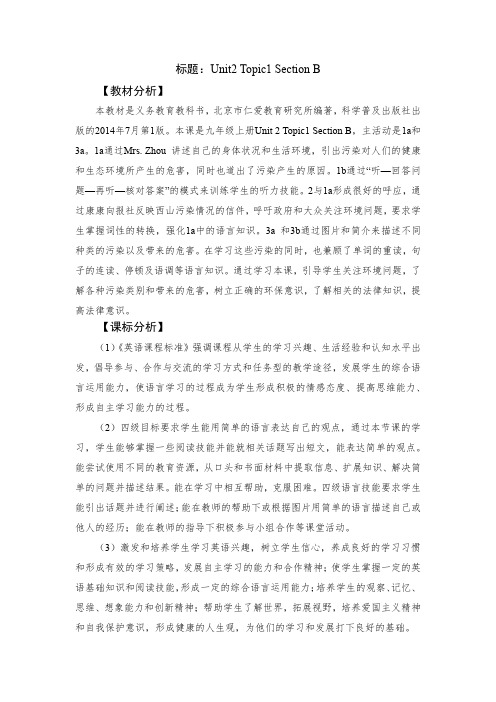
标题:Unit2 Topic1 Section B【教材分析】本教材是义务教育教科书,北京市仁爱教育研究所编著,科学普及出版社出版的2014年7月第1版。
本课是九年级上册Unit 2 Topic1 Section B,主活动是1a和3a。
1a通过Mrs. Zhou 讲述自己的身体状况和生活环境,引出污染对人们的健康和生态环境所产生的危害,同时也道出了污染产生的原因。
1b通过“听—回答问题—再听—核对答案”的模式来训练学生的听力技能。
2与1a形成很好的呼应,通过康康向报社反映西山污染情况的信件,呼吁政府和大众关注环境问题,要求学生掌握词性的转换,强化1a中的语言知识。
3a 和3b通过图片和简介来描述不同种类的污染以及带来的危害。
在学习这些污染的同时,也兼顾了单词的重读,句子的连读、停顿及语调等语言知识。
通过学习本课,引导学生关注环境问题,了解各种污染类别和带来的危害,树立正确的环保意识,了解相关的法律知识,提高法律意识。
【课标分析】(1)《英语课程标准》强调课程从学生的学习兴趣、生活经验和认知水平出发,倡导参与、合作与交流的学习方式和任务型的教学途径,发展学生的综合语言运用能力,使语言学习的过程成为学生形成积极的情感态度、提高思维能力、形成自主学习能力的过程。
(2)四级目标要求学生能用简单的语言表达自己的观点,通过本节课的学习,学生能够掌握一些阅读技能并能就相关话题写出短文,能表达简单的观点。
能尝试使用不同的教育资源,从口头和书面材料中提取信息、扩展知识、解决简单的问题并描述结果。
能在学习中相互帮助,克服困难。
四级语言技能要求学生能引出话题并进行阐述;能在教师的帮助下或根据图片用简单的语言描述自己或他人的经历;能在教师的指导下积极参与小组合作等课堂活动。
(3)激发和培养学生学习英语兴趣,树立学生信心,养成良好的学习习惯和形成有效的学习策略,发展自主学习的能力和合作精神;使学生掌握一定的英语基础知识和阅读技能,形成一定的综合语言运用能力;培养学生的观察、记忆、思维、想象能力和创新精神;帮助学生了解世界,拓展视野,培养爱国主义精神和自我保护意识,形成健康的人生观,为他们的学习和发展打下良好的基础。
新版仁爱版九年级上册unit2topic1短语

Unit 2 Saving the EarthTopic 1 pollution has caused too many problems污染已经造成了太多问题Section A1 plan to do sth. 计划做某事I plan to go swimming tomorrow. 我计划明天去游泳。
2 shall …好吗?用于建议,只能够用于第一人称,如shall I, shall we3what about=how about, 后加名词或名词短语,或者句子表建议。
4 see sb. doing sth. 看见某人正在做某事I can see the butterfly dancing there.Hear sb. doing sth. 听见某人正在做某事I can hear her crying. 我听见她正在哭。
see sb. do sth. 看见某人经常做某事,或者看见某人做过某事hear sb. do sth. 听见某人经常做某事,或者听见某人做过某事。
5 sound 感官动词,详细请看unit1 topic3的解释。
6 mess, 混乱,名词。
Messy,形容词,混乱的7 what a shame!多羞耻啊8 several 几个9 chemical factory 化工厂10 pour…into…把…倒入… look,there are several chemical factories pouring waste water into the stream. 看,有几个化工厂正把废水倒入溪里。
11 want to do sth. 想要做某事。
12 destroy 摧毁13 cut down 砍倒14 hill小山,mountain大山15 lake,湖泊,river 河流,stream 小溪,sea 海,ocean海洋,waterfall瀑布Section B1 what’s wrong with sb.=what’s the matter with sb. 问候某人的身体状况2 It is +形容词+to do sth. 做某事对某人而言,很…It’s difficult for me to breathe. 呼吸对我而言很困难。
仁爱版英语九年级上册说课稿Unit2Topic1

仁爱版英语九年级上册Unit2 Topic1 Pollution causes too many problems. Section D说课稿尊敬的各位老师:大家下午好!今天我说课的题目是九年级英语Unit 2 Topic1 Pollution causes too many problems. Section D。
本次说课我将从四个方面向大家进行介绍,他们分别是:教材分析、教法分析、学法指导以及教学程序,首先让我们来看一下本次说课的第一部分,即教材分析部分。
在教材分析中,我将对教材从1、教材地位和作用,2、教学目标,3、教学重点、难点三个方面进行分析。
一.教材分析1、教材的地位和作用本课是仁爱版九年级第二单元第一话题Section D的内容。
本课是本话题的重要组成部分,以口语、听力练习、复习、总结为主,通过谈论污染这一话题,复习直接引语和间接引语,让学生学会把直接引语变为间接引语的方法,总结污染的种类及其危害,教育学生环保从身边做起,提高环保意识。
本部分是前后知识的载体,本话题的表达在初中英语教学中占有重要地位。
2、教学目标根据初中英语新课程标准的要求,结合课本教材,确定本节课的教学目标如下:即知识目标、能力目标和情感目标。
(1).在知识目标中,让学生掌握直接引语和间接引语的相互变化的方法,听懂短文内容,掌握一些新单词和短语,完成自主学习任务,这是本节课所要达到的知识目标。
(2).在能力目标方面,着重让学生理解有关污染的短文,能进行直接引语和间接引语的转变,并激发学生对英语学习的兴趣,这是本节课所要达到的能力目标。
(3). 情感目标:在培养学生组织和运用语言能力的基础上,让学生了解地球污染的一些情况,进一步引导学生懂得环境保护的重要性,增强环保意识,为保护环境做力所能及的事情。
3、教学重点和难点本节课的重点、难点部分,在本节课当中掌握直接引语和间接引语的相互变化的方法,短文理解,掌握新词是本节课的重点。
仁爱版九年级英语上册Unit2 Topic 1课件(共75张PPT)

(go). 3. Everything __h_a_s_c_h_a_n_g_e_d__ (change) in the past few years. 4. Pandas don’t have enough bamboos __t_o_e_a_t__ (eat) now
B.too much
C.many too
D.too many
Unit 2 Saving the Earth
Topic 1 Pollution has caused too many problems .
Section B
• 1 breathe v.意为“呼吸”,名词是breath,注 意不同词性时单词的拼写。
gone. A: What has happened here? B: The villagers have destroyed them.
hill/ trees farmers/cut down
lake/fish factory/ pollute
B. Listen again and complete the sentences.
Two years ago
Now
1. It was a __b_e_a_u_t_if_u_l_p_la_c_e__. 1.T_h_e__fl_o_w_e_r_s__a_n_d_g_r_a_s_s_
2. There were
have gone.
__lo_t_s__o_f _fl_o_w_e_r_s__a_n_d_g_r_a_s_s_. 2. The water is _s_o__d_i_rt_y_and
仁爱版英语九年级上册unit2教案

仁爱版英语九年级上册unit2教案教案要面向全体学生,关注每个学生的情感,激发他们学习英语的兴趣,帮助他们建立学习的成就感和自信心,使他们在学习过程中发展综合语言运用能力,下面是我给大家整理的仁爱版英语九年级上册unit2教案5篇,希望对大家能有所帮助!仁爱版英语九年级上册unit2教案1Unit1TheDevelopingWorldTopic1ChinahasdevelopedrapidlyInrecentyears.SectionAThemainactivityis1a.本课重点活动是1a。
Ⅰ.Teachingaimsanddemands教学目标1.Learnsomenewwordsandaphrase:proper,bytheway,bell,grandpa,chairwoman,grandson2.Learnausefulsentence:Theregoesthebell.3.Learnthepresentperfecttense:(1)Rita,youhavejustcomebackfromyourhometown.(2)—Wherehaveyoubeen,Jane?—IhavebeentoMountHuangwithmyparents.(3)—Bytheway,where’sMaria?—ShehasgonetoCubatobeavolunteer…4.Taltthechildren’svacationexperiences.Ⅰ.Teachingaids教具录音机/小黑板/学生的旅游纪念照/图片/幻灯片Ⅰ.Five-fingerTeachingPlanStep1Review通过教师询问学生的暑期活动,导入话题,呈现部分生词。
T:Listen!Thebellisringing.Let’sbeginourclass!(教师解释Thebellisringing等于Theregoesthebell,板书bell,要求学生掌握。
仁爱版九年级英语上册Unit1_Topic2_SectionB_优质课课件(共20张PPT)
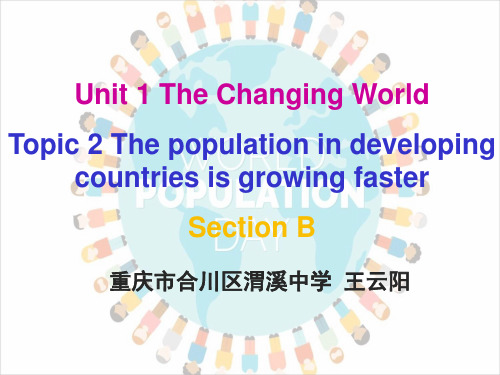
1. the world 2. China
3. India
4. the USA
A. 309 million B. 6.8 billion C. 1.3 billion D. 1.1 billion
Make similar conversations after the example.
Example: A.: What’s the population of the world? B: It’s about 6.8 billion.
= The world has a population of 6.8 billion.
80 80 80
6800
The population is increasing by 80 million every year.
What a large population!
1b Listen to 1a and match the information.
1a Listen,look and say.
提示:点击图片即可观看动画
So it is. 确实如此。
SSooSsoshheiet dihsoa.ess..
SThhLeeuchsyauspdeacrnlmecaenrsekdet is vtvehereryyrcowroeomlwl.ded.
So +主语+ be/情态动词/助动词
population
表示整体人口(作单数)
e.g. The population of this city is nearly 300 000. 这个城市的人口将近三十万。
BACK
表示部分人口(作复数)
e.g. 80% of the population in Chinaare farmers. 中国百分之八十的人口是农民。
九年级英语仁爱版上册Unit1_Topic2_SectionB_同步课堂帮帮帮
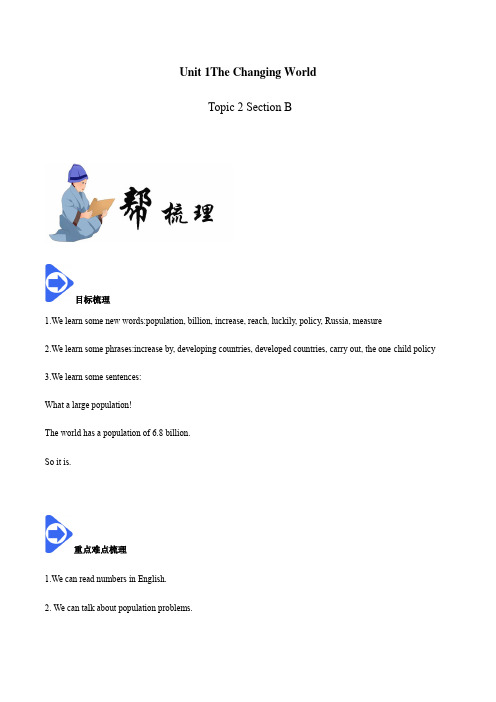
Unit 1The Changing WorldTopic 2 Section B目标梳理1.We learn some new words:population, billion, increase, reach, luckily, policy, Russia, measure2.We learn some phrases:increase by, developing countries, developed countries, carry out, the one-child policy3.We learn some sentences:What a large population!The world has a population of 6.8 billion.So it is.重点难点梳理1.We can read numbers in English.2. We can talk about population problems.知识梳理【1】What a large population!这么多人口!population人口,人口数量。
描述人口多寡时通常用large或small.population作主语时,谓语动词用单数或复数都可以。
have/has a population of...有……人口e.g.One third of the world's population consumes/consume two thirds of the world's resources.世界上三分之一的人口消耗着全球三分之二的资源。
e.g.What's the population of China?中国的人口是多少?【2】And it is increasing by 90 million every year.而且世界人口每年增加九千万。
increase by...增加了·…,by表示增长幅度,其后常跟百分数。
